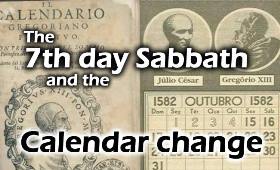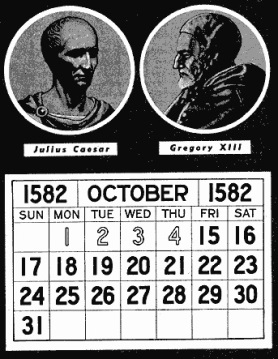.
THE 7TH DAY SABBATH AND THE GREGORIAN CALENDAR CHANGE - PROOF THAT THE WEEKLY CYCLE NEVER CHANGED - AND, DOES IT MATTER?
 There are many professed Christians today who reject Saturday as being the 7th day Sabbath, simply because of the change that was made in the calendar by Pope Gregory. It is
true that the calendar we use today is known as the 'Gregorian' calendar, due to a change instigated by Pope Gregory in 1582. This change was made due to the 'inaccuracy' of the
previous calendar established by Julius Caesar. It is stated by many professed Christians today that we do not know which day the original 7th day of the week from the Bible is.
But on this page we will show proof that our Saturday today is the 7th day of the week from Bible times.
There are many professed Christians today who reject Saturday as being the 7th day Sabbath, simply because of the change that was made in the calendar by Pope Gregory. It is
true that the calendar we use today is known as the 'Gregorian' calendar, due to a change instigated by Pope Gregory in 1582. This change was made due to the 'inaccuracy' of the
previous calendar established by Julius Caesar. It is stated by many professed Christians today that we do not know which day the original 7th day of the week from the Bible is.
But on this page we will show proof that our Saturday today is the 7th day of the week from Bible times.
The issue with the Julian calendar is that it added a leap day every 4 years, without exception, and this resulted in adding too many days than is required for an accurate solar calendar. The Julian calendar had commenced the 1st of January of the 46th year before the birth of Christ (the 708th from the foundation of Rome). At that time the Spring equinox fell on March 25th, but because of the Julian calendar's inaccuracy, it had gradually drifted earlier over the years to March 10th or 11th by 1582. This error was important to the Catholic church, because under the solar Julian calendar, the date of Easter (probably the most important date to the Catholic church), was gradually creeping farther and farther (earlier and earlier) away from the time of year set by the Council of Nicea in 325 A.D., when the equinox fell about March 21st. Easter was then to be observed by Roman Catholics on the first Sunday after the full moon occurring after the Spring equinox, except when that coincided with the Jewish Passover, in which case Easter was delayed to the following Sunday.
 To correct this perceived Easter problem, Pope Gregory XIII returned the Spring equinox to March 21st by decreeing that Thursday, October 4th, 1582, would be followed not by the
5th, but by Friday, October 15th. He jumped the calendar 10 days numerically. But what is important to realize is that he did not change the weekly cycle of days.
To correct this perceived Easter problem, Pope Gregory XIII returned the Spring equinox to March 21st by decreeing that Thursday, October 4th, 1582, would be followed not by the
5th, but by Friday, October 15th. He jumped the calendar 10 days numerically. But what is important to realize is that he did not change the weekly cycle of days.
You can see a translation of Pope Gregory's 'Inter Gravissimas' Papal Bull HERE - showing that Thursday 4th was followed by Friday 15th, with no change to the weekly cycle.
So that this correction would be maintained, the Pope then decreed that leap years would occur only when the year was divisible by four, and only the centennial years that were divisible by 400 would be leap years. During a leap year, one day is added to the month of February (the 29th), as a correction. This method of calendar keeping was gradually adopted across Europe, and the world, and is nearly universal today.
England did not adopt the Gregorian calendar until 1752. By that time, eleven days had been gained, so Wednesday September 2, was followed by Thursday September 14. The eleven days were skipped, but the weekly cycle of days, Sunday through Saturday, remained unchanged throughout the Middle Ages.
Not only do we have proof from the translated Paper Bull issued by Pope Gregory, we also have documented letters from the United States Naval Observatory in Washington DC and the Royal Greenwich Observatory in London, after inquiries were made in 1932. Take a look at what those letters state:
"I can only state that in connection with the proposed simplification of the calendar, we have had occasion to investigate the results of the works of specialists in chronology and we have never found one of them that has ever had the slightest doubt about the continuity of the weekly cycle since long before the Christian era." (James Robertson, Director, US Naval Observatory, Washington DC, March 12, 1932 - SOURCE)
Let me just repeat that so you don't miss it - "we have never found one of them that has ever had the slightest doubt about the continuity of the weekly cycle since long before the Christian era." - Not the SLIGHTEST doubt!
"As far as I know, in the various changes of the calendar there has been no change in the seven day rota of the week, which has come down from very early times. There have been attempts in the French revolution and in Russia to alter this cycle." (Astronomer Royal, Greenwich Royal Observatory, London, 4th March, 1932 - SOURCE)
Where did the 7 day weekly cycle come from according to the above letter? From "very early times." Which as we know is from Bible times, even from the creation week of Genesis. If you continue to read the letter from Greenwich Observatory, you will see they state there is evidence that 7 day weekly cycle is independent from from the monthly cycle and from all astronomical periods, and that it passed from the Jewish church to the Christian. What does this also prove? That the Sabbath is NOT based on the lunar cycle, showing the lunar Sabbath theory to be false. See our page EXPOSING THE LUNAR SABBATH for more. Not only that, did you notice the letter said the French revolution and Russia tried to change the weekly cycle? Satan has tried but FAILED, because God has preserved His holy Sabbath day.
Sunday keeping Christians are quick enough to say that Sunday (1st day of the week) is the day Jesus was resurrected. Which makes Saturday the 7th day of the week. But then they proclaim that we do not know which day the 7th day is. Well, you don't know which day the 1st day is either then - the day in which Jesus Christ rose from the dead. This is the utter confusion that reigns in the fallen churches, known as 'Babylon' (confusion).
The Jews have faithfully kept the 7th day Sabbath for thousands of years and today they keep sundown Friday to sundown Saturday - the 7th day of the week - the day that God specifically set aside for rest and holy use at creation and confirmed in His ten commandments. But now I hear another statement from professed Christians ... "It doesn't matter which day you keep as Sabbath."